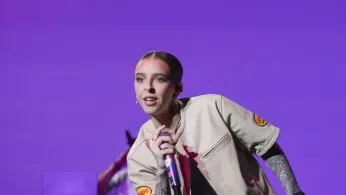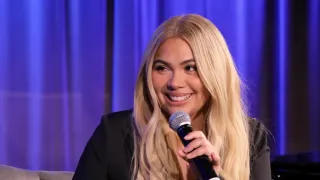
4 hours ago
Young Miko Goes ‘Do Not Disturb’: The New Face of Queer Latinx Power Pop, No Filter Required
READ TIME: 4 MIN.
The first time you see Young Miko on stage, you might not know what to expect. She’s not serving the typical reggaeton look—her fashion is androgynous, her haircut sharp, her lyrics full of unapologetic swagger. But give the crowd “10 or 15 minutes,” she says, and “they can’t help but dance and let loose” . That’s what she calls “the Miko Effect.” It’s not just about the beats—it’s about the energy shift that happens when someone fully owns who they are. For LGBTQ+ fans, it’s about finally seeing a superstar who sounds like us, looks like us, and loves like us.
Miko, born María Victoria Ramírez, is the openly lesbian Puerto Rican rapper whose sound has redefined Latin urban music. With over 20 million monthly listeners on Spotify and a debut album (Att.) already earning a Grammy nomination, she’s everywhere right now—on your playlist, on tour with Billie Eilish, and in the hearts of queer fans from San Juan to Los Angeles .
Despite her viral success, Miko shrugs off the idea of having “made it.” “I don’t think I want to have an ‘I made it’ moment, ’cause I don’t want to be like, ‘Wait, where do I go from here?’ I always want to feel like I’m a student,” she says . It’s the humility and hunger that keep her grounded—a rare combo in a world that’s always demanding a victory lap.
But what truly sets Miko apart isn’t just her chart stats. It’s her visibility. She’s the openly queer artist she never saw growing up. “I never really had the gay icon that I would look up to, or at least I didn’t know a lot of gay people around me,” she recalls. “Being able to move forward with that love and care for other people that may need it, I think it is my biggest achievement ever” .
In a genre where machismo and heteronormativity have ruled for decades, Miko’s presence is nothing short of revolutionary. Her authenticity doesn’t just resonate—it detonates. “When I started writing music, I was like, ‘F*ck it, people already know I’m gay, and why would I sing to men? Respectfully,’” she told Billboard .
Miko’s recent turn to “Do Not Disturb” mode isn’t about hiding from the world; it’s about carving out space for herself. After years of hustling, self-doubt, and the pressure to fit a mold, she’s learning to put her own needs first. “I realized I didn’t want to live the rest of my life that way,” she says about the years spent hiding her identity. “The moment I started to accept and open up, care for myself, and really accept myself was when I truly started to live” .
It’s a message that’s striking a chord with queer fans worldwide. Her concerts are a sea of pride flags, a safe haven for LGBTQ+ youth who finally see a superstar openly loving women and loving herself. “You can just tell by the way a fan is singing if it’s hitting home or not, and I can’t help but just stand in front of that person and look at them and just be like, ‘I see you, you’re feeling that at the bottom of your heart,’” she told *Good Morning America* .
At the 2024 Billboard Women in Music event, Miko received the Impact Award for her role as a beacon of self-love and community. “I try to take care of myself, and being able to love myself also means being able to take care of my people. I think you can’t love what you do or the people around you if you don’t love yourself first,” she said from the stage .
When Miko stepped onto the stage as the opening act for Billie Eilish’s US tour, it wasn’t just another gig—it was a full-circle queer pop moment. Fans on social media raved about their “bromance,” with Miko’s track “Likey Likey” whipping the crowd into a frenzy . For Miko, sharing the spotlight with another queer superstar is a sign of how far the music industry has come—and how much further it still needs to go.
Her rapid rise isn’t just hype. It’s recognition from legends: Ivy Queen, Jowell y Randy, and Bad Bunny have all given her their stamp of approval . Still, her focus remains on community—her crowds, her queer siblings, her fans who may not have had a role model growing up.
Miko’s ambitions don’t end at the microphone. She’s got her eye on acting, collaborating with Studio Pierrot on McDonald’s “WcDonald’s Anime Series”—a partnership that’s as delightfully oddball as it is on-brand for a lifelong anime nerd . Her stage name itself is a nod to Japanese culture, reflecting the global, hybrid identity that so many queer fans relate to.
She sees her role as a queer trailblazer with humility, but she gets the gravity. “It’s a big responsibility… Getting to understand and comprehend the fact that other people can do as they please because of something that I did, it speaks volumes. I’m happy that I’m able to leave something behind,” Miko told Remezcla .
There’s a reason Miko’s fandom feels different. She’s not just a musician; she’s a movement. In an era of rainbow capitalism and surface-level “representation,” Miko’s realness is the antidote. She’s not here to be a sanitized queer icon or a corporate mascot—she’s here to dance, to flirt, to rap about love and heartbreak, and to let every queer kid know that their story is worthy of center stage.
Looking back at her younger self, Miko recently said, “I’d tell baby Miko that she’s doing just fine… I don’t feel like I’ve changed at all. I feel like more than anything I’d just like to hug her” . For every LGBTQ+ listener who ever needed a hug from someone who made it out the other side, Young Miko is that embrace—and that invitation to dance.






